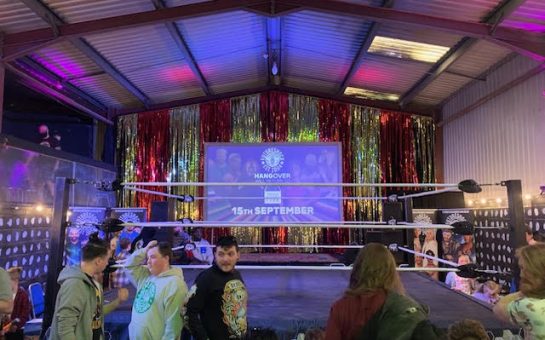Was 9/11 an inside job? Is the Queen really a lizard? Did NASA land on the moon?
Dr Daniel Jolley is Britain’s leading academic debunker of conspiracy theories. He is delivering a series of talks in the UK on the psychology of conspiracy theories and how otherwise rational individuals become enraptured by them.
The Psychology of Conspiracy Theories will take place at Texture on Lever Street in the city’s Northern Quarter on 23 August.
Mancunian Matters arranged covert talks with Dr Jolley at an undisclosed location to find out the truth behind the conspiracies.
Dr Jolley explains that conspiracy theories are “attempts to explain the ultimate cause of events as secret plots by powerful forces rather than as overt activities.”
He tells MM that he is concerned that conspiracy theories are becoming a way for many people to explain the world.
He said: “People use to flirt with one or two conspiracy theories. They might believe that JFK was killed by the CIA or NASA faked the moon landing.
“But now conspiracy theory is becoming a much larger world-view in which every bad thing that happens is attributed to a secret, malevolent group of powerful people who rule the world.”
He says the internet is responsible for generating an unaccountable climate of fear, hostility and paranoia.
“The prevalence of conspiracy theories today is due to social media. It provides a limitless platform for their dissemination and can go viral within hours. It’s very difficult to combat.”
Dr Jolley thinks celebrity conspiracy theorists like Britain’s David Ike and US right-wing radio host Alex Jones can be a dangerous influence.
Dr Jolley describes both men as apocalyptic demagogues whose prolific stream of online conspiracy chatter breeds a ‘culture of paranoia’.
Mr Ike and Mr Jones believe a secret supra-national group of world leaders and financiers are hellbent on creating an oppressive global empire. They refer to these harbingers of doom as the ‘Illuminati’ and the dystopian society they seek to establish as the ‘New World Order’.
Mr Jones’ radio show Infowars reaches 3.3million listeners in the US every month and Mr Ike has sold over 150,000 books at a value of more than £2million.
Conspiracy theory is clearly big business.
Icke and Jones have millions of followers on social media and they wield considerable influence over how their audiences perceive the world and engage with society.
Missing jetliners, bizarre celebrity deaths, extreme weather and advances in technology are all tenuously connected by a patchwork of theories to the ‘Illuminati’ and their insatiable quest for global hegemony.
But Dr Jolley wants to dispel the idea that conspiracy theories are the exclusive preserve of fanatics in tin-foil hats.
He says: “They are not just for crazy people. Some people are more prone to them than others but we are all susceptible to believing in conspiracy theories.
“Many of us, at some point in time, will flirt with a conspiracy theory to explain a tragic event. We all enjoy a good story and sometimes the truth isn’t satisfying enough. Big events need big causes.”
Millions of people around the world subscribe to conspiracy theories and they can prove difficult to counter-act.
“Conspiracy theories are very influential. They can change how we see other people, how we interpret events and engage with the rest of society.
“Once they are ingrained in a person’s belief system they can be extremely difficult to combat.”
But are conspiracy theories really that dangerous?
“Absolutely”, says Dr Jolley.
“People who are prone to believing in conspiracy theories can stop engaging with society in a positive way.
“If they are exposed to the idea that climate change is a hoax they may be less inclined to engage in energy efficient behaviour.”
Dr Jolley applies a psychological framework to explore why some people accept a conspiracy theory over official explanations.
During his presentation, The Psychology of Conspiracy Theories, Dr Jolley demonstrates the experimental methods he uses to examine the social consequences of exposure to conspiracy theories and the dangers inherent in them.
He says people influenced by conspiracy theories can make decisions based on their beliefs that may harm their own life and the lives of others.
Dr Jolley cites the MMR vaccine as a prime example. The controversy behind the MMR vaccine and its alleged links to autism, propagated by British medical researcher Andrew Wakefield in 1998, led some parents to choose not to vaccinate their child.
Wakefield had his academic paper retracted and medical license revoked for professional misconduct in using fraudulent data to bolster his findings.
But twenty years after Wakefield’s spurious claims, the conspiracy theory holds strong and continues to influence parents around the world.
Dr Jolley’s claims are substantiated by figures released from the US Centers for Disease Control and Prevention.
Between 2007-2015, they attributed 9028 preventable infant deaths in the US to non-vaccination.
According to Dr Jolley, this is evidence of a definite causal relationship between a belief in conspiracy theories and a suspicion of vaccinations.
“I want to raise awareness of the harmful effects of conspiracies and to suggest ways that the media and the general public can combat their dissemination and propagation.
“Conspiracy theories can be fun and they are successful and popular because they are good stories.
“But with some conspiracies, such as Jewish financiers ruling the world, you must ask yourself – what is the motivation behind this story? What is it really trying to achieve?
“Like fake news, some stories are manufactured with odious intent and can lead passive readers into adopting paranoid and racist beliefs.”
It seems that the origin of the conspiracy theory can be more sinister than the conspiracy itself.
Dr Jolley’s lecture, The Psychology of Conspiracy Theories, gives the audience an insight into how conspiracy theories operate on a psychological level and the most effective means of challenging them.
Tickets for Dr Jolley’s Manchester talks are now on sale.



